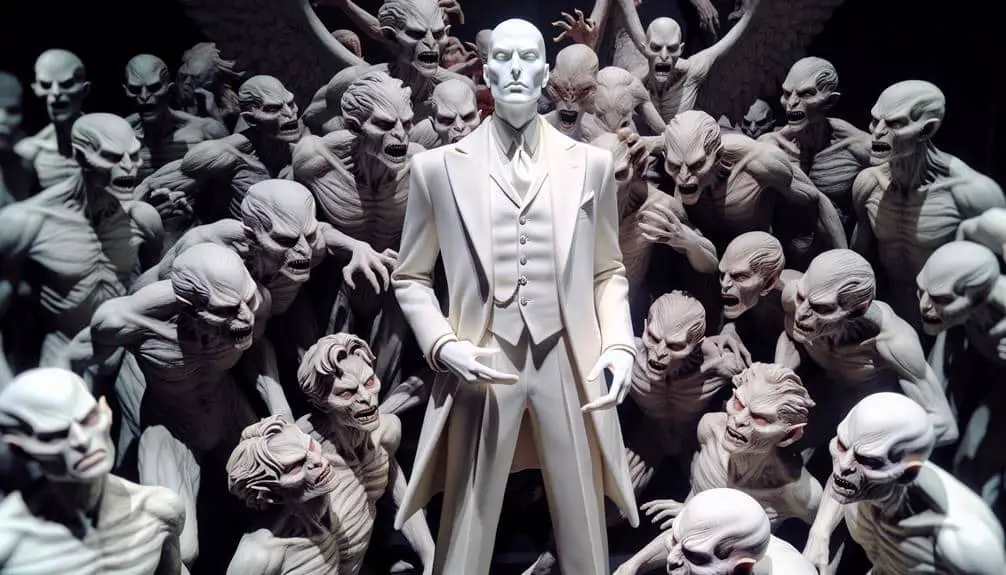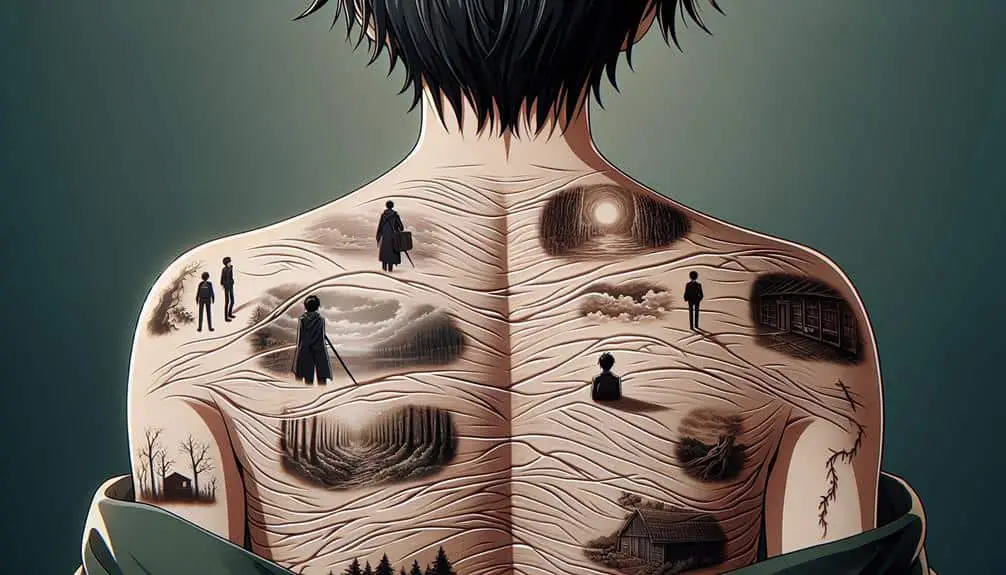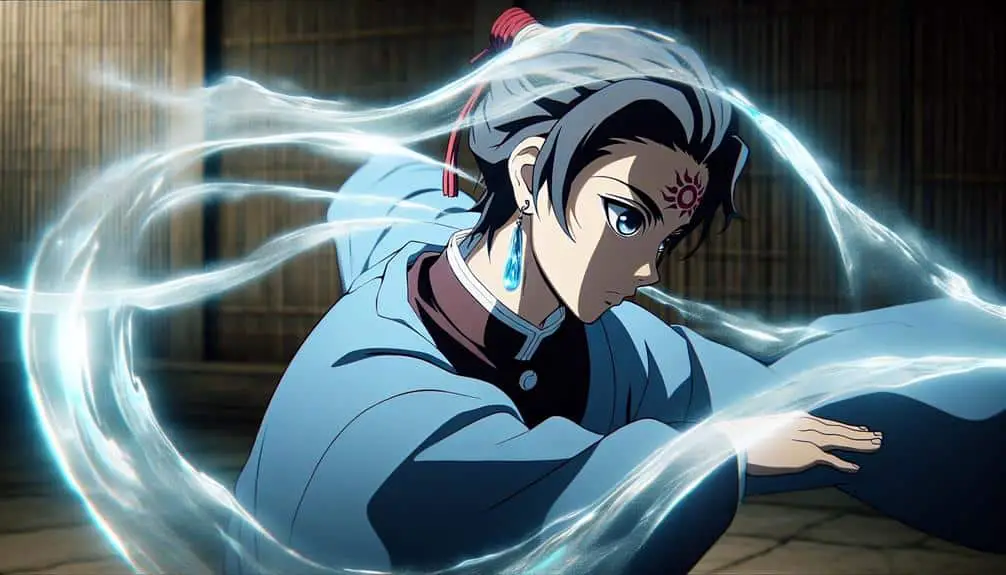Kibutsuji Muzan profoundly altered demon society by restructuring the hierarchy, creating fear, and wielding immense influence over demons and humans. Demonstrating strategic prowess, he manipulated key figures and established a centralized power structure, shaping a new class of elites. Muzan's tactics instilled obedience as a survival necessity, fostering a climate of fear and dominance. By manipulating human-demon interactions and controlling information flow, he altered the societal landscape. The lasting legacy of Muzan's reign continues to reverberate, impacting the power dynamics and psychology of demon society. His influence remains a pivotal chapter in demon history.
Key Points
- Muzan instilled palpable fear, ensuring obedience.
- He manipulated human-demon interactions to sow chaos.
- Muzan established a centralized power structure.
- His reign created a lasting legacy of fear and dominance.
- Post-Muzan, demon society faced a power struggle.
Origins and Rise to Power
Kibutsuji Muzan's ascent to power within demon society can be traced back to his mysterious origins and strategic manipulation of key figures. His origins are shrouded in secrecy, with little known about his early life before emerging as a powerful figure in demon circles. Muzan's rise to power was characterized by his ability to exploit existing power dynamics and instill fear to solidify his influence over demon society.
His impact on demon society was profound, leading to a transformation of the demon hierarchy. By manipulating human-demon relations and sowing discord among key players, Kibutsuji Muzan disrupted the established order, leaving a legacy of chaos and uncertainty in his wake. The aftermath of his reign continues to reverberate through demon society, with lasting repercussions that have yet to be fully resolved.
Kibutsuji Muzan's strategic cunning and ruthless pursuit of power have left an indelible mark on demon society, shaping its trajectory for years to come.
Transformation of Demon Hierarchy
The reorganization of the demon hierarchy was marked by a substantial shift in power dynamics and structural arrangements. Under the influence of Kibutsuji Muzan, demons experienced a profound transformation in their societal structure. Muzan's ability to grant powers and immortality to demons created a new class of elites within the hierarchy, altering the traditional power dynamics significantly. Demons who gained favor with Muzan rose through the ranks swiftly, challenging the existing order and creating a more fluid system where strength and loyalty to Muzan became paramount.
This restructuring led to the emergence of a centralized power structure, with Muzan at the helm, exerting control over various factions and individuals. The once decentralized demon society became more unified under his rule, with a clear hierarchy based on subservience and strength rather than traditional norms. This shift in power dynamics not only changed the landscape of demon interactions but also brought about a sense of fear and reverence towards Muzan, solidifying his influence over the demon world.
Fear and Influence on Demons
Amidst the restructured demon society influenced by Kibutsuji Muzan, a palpable sense of fear and unwavering influence permeated through the ranks, shaping the very fabric of demon interactions and power dynamics. The fear instilled by Muzan's ruthless control tactics kept demons in line, fostering an environment where obedience was paramount to survival. This fear wasn't just a fleeting emotion but a strategic tool wielded by Muzan to maintain his dominance and authority over his subordinates.
Muzan's control over demons wasn't solely based on fear but also on the intricate web of influence he weaved. Through manipulation and calculated displays of power, he solidified his position as the ultimate authority in demon society. Demons feared his wrath and coveted his favor, leading to a complex hierarchy where loyalty to Muzan equated to opportunities for advancement and survival. This control and influence extended beyond mere power dynamics, seeping into every aspect of demon life and interactions, creating a society where Muzan's word was law and dissent was met with swift and severe consequences.
Manipulation of Human-Demon Relations
Influencing the delicate balance between humans and demons, Kibutsuji Muzan strategically manipulates the dynamics of their relations, subtly shaping the interconnectedness of both worlds. Through his manipulation tactics and understanding of power dynamics, Muzan has greatly altered the way humans and demons interact, leaving a lasting impact on demon society.
Here are key aspects of how he influences human-demon relations:
- Subterfuge: Muzan employs deceptive tactics to sow chaos and confusion among humans and demons, creating an atmosphere of mistrust and fear.
- Control of Information: By controlling the flow of information between the two worlds, Muzan carefully crafts narratives that serve his agenda, perpetuating the cycle of manipulation.
- Exploitation of Vulnerabilities: Muzan preys on the vulnerabilities of both humans and demons, using their weaknesses to his advantage and perpetuating a cycle of dependence.
- Strategic Alliances: Muzan forms strategic alliances with influential figures on both sides, leveraging these connections to further his goals and maintain his hold over human-demon relations.
Legacy and Aftermath
Having left a trail of manipulation and upheaval in his wake, Kibutsuji Muzan's legacy reverberates throughout demon society, casting a shadow that extends far beyond his physical presence. The impact of Kibutsuji Muzan's legacy on demon society is profound, evident in the societal changes that have unfolded since his demise. His reign of terror instilled fear and dominance among demons, shaping power dynamics and fueling ambitions within their ranks. The vacuum left by his absence has led to a power struggle as factions vie for control and influence, causing internal strife and external conflicts that continue to shape the demon world.
Furthermore, Kibutsuji Muzan's legacy impact extends to the psychological domain, with many demons grappling with the aftermath of his tyranny. Some demons idolize his strength and ruthlessness, seeking to emulate his legacy, while others fear the consequences of such actions. The societal changes post-Muzan reflect a complex landscape where allegiances shift, alliances form and dissolve, and a new order emerges from the ashes of his reign.




